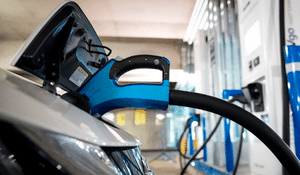Biden wants 500,000 EV charging stations. Here's where they should go
Fewer than 10% of Americans have easy access to an electric vehicle charging station, and those who do tend to be wealthy and white.
Why it matters: The Biden administration wants EVs to comprise 50% of all new car sales by 2030, an ambitious target that will likely require broader consumer incentives. But if electric vehicles are going to achieve mass market adoption, people also need to be able to find charging plugs.
While most early buyers of EVs have chargers at home, it's not so easy for renters or people who live in multi-unit dwellings to find a place to plug in.
Where it stands: The U.S. has 104,000 public charging plugs available today, just 18% of which are so-called "Level 3" or "DC fast chargers," which can replenish an EV battery in an hour or less.
President Biden wants to see an additional 500,000 public charging stations deployed nationwide to support his EV ambitions.
The good news: There's an expected $7.5 billion for EV charging included in the $1.2 trillion “hard” infrastructure package currently being debated in Congress.
Driving the news: A new analysis of EV charging access in the 50 largest U.S. cities could help authorities decide where to put those plugs to optimize public access.
The report by location analytics firm Mobilyze.ai, and funded by the Toyota Mobility Foundation, studied demographic data, EV ownership and existing charging locations to see which U.S. households have convenient access to public charging and which do not.
What they found: Only 9.7% of households in U.S. cities have access to a public EV charging station within 1/4 mile (or a 5-minute walk) from home.
Wealthy households have better access in some populous cities like New York and Chicago. But in many other cities, lower-income households live closer to charging in downtown areas.
Black and Latino communities have significantly fewer charging stations than white neighborhoods. In Baltimore, Atlanta, Washington, D.C. and Boston, for example, the percentage of Black people living within a 5-minute walk of a charging station is at least 20% lower than in the rest of the city.
More charging equity is needed, the study found. If charging stations were deployed at each of the 169 Baltimore City Public Schools, for example, it would provide access to 158,000 more residents, narrowing that racial gap.
The U.S. has 18.5 EVs per charging plug today, but international benchmarks suggest one charger is needed for every 10 to 15 EVs. Even in California, the leading U.S. market for electric cars, EV adoption is outpacing charger deployment in some cities.
The catch: EVs are still more expensive on average than conventional vehicles, so closing the charging gap is only one step to a more equitable electric vehicle future.
The bottom line: There aren't enough EV chargers, and many cities don't have them in the right places, with Black and Latino neighborhoods having the least access.

